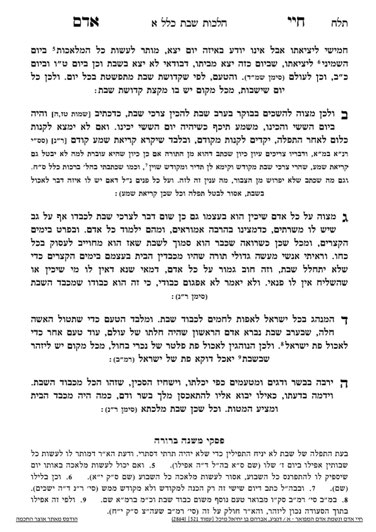We are continuing in siman 4, but have taken a tangent to discuss the halachos of pas akum, pas palter, and pas yisroel. We last learned that when bais din makes a takana, if Klal Yisroel does not accept it, it can be rescinded by a later bais din, even if the later bais din is not greater in stature and authority.
We must remember that the original takana was not made out of a concern of kashrus, but rather for cases where there were no issues of kashrus. The takana was made to prevent intermarriage. Nevertheless, as we learned yesterday, Klal Yisroel did not accept the takana. The reason they did not accept it is because bread was too crucial of a staple for it to be feasible to keep the takana.
Although it is clear that bais din rescinded this takana, there is a machlokes as to how it was rescinded. The Shulchan Aruch understands that pas akum–meaning, bread baked by a private non-Jew–remains assur. Pas palter, which is made for the purpose of selling and commerce, does not engender the same levels of intimate connection, and only that was made muttar. However, the Shulchan Aruch is only lenient on pas palter when pas yisroel is not available within a certain distance (approx 20 minutes).
The Rema understands the rescindment of bais din in a much more lenient manner, and understands that if one of the three conditions are met, pas palter is muttar:
- The price of pas palter is significantly cheaper than the price of pas yisroel;
- If the type of bread the consumer is looking for is not available as pas yisroel (e.g., english muffins);
- The taste of the pas palter is better than the taste of pas yisroel.
The Rema agrees with the Shulchan Aruch that pas akum (bread baked by an individual non-Jew for personal use without the intention to sell it) remains assur at all times.
The Chayei Adam comes along, and adds that even though we (Ashkenazim) follow the Rema, pas palter should be nonetheless avoided on Shabbos. The Chayei Adam explains there are opinions that even after the rescindment of the takana, pas palter should still be avoided or should only be relied upon in extenuating circumstances. There is also an opinion that the Gemara can be understood differently in which it does not conclude with a leniency. Therefore, since Shabbos is a more holy day, it is preferable to consume pas yisroel. The Chayei Adam understands that this preference is another reason why one should bake their own bread.
We will clarify more about this concept in the next shiur, be’ezras Hashem.
Summary
- The Shulchan Aruch holds that pas palter is only permitted when pas yisroel is unavailable within a distance of approximately 20 minutes. The Rema holds that pas palter is muttar if it is significantly cheaper or tastes better than pas yisroel, or if the specific type of bread is not available as pas yisroel.
- The Chayei Adam holds that preferably, one should only consume pas yisroel on Shabbos



